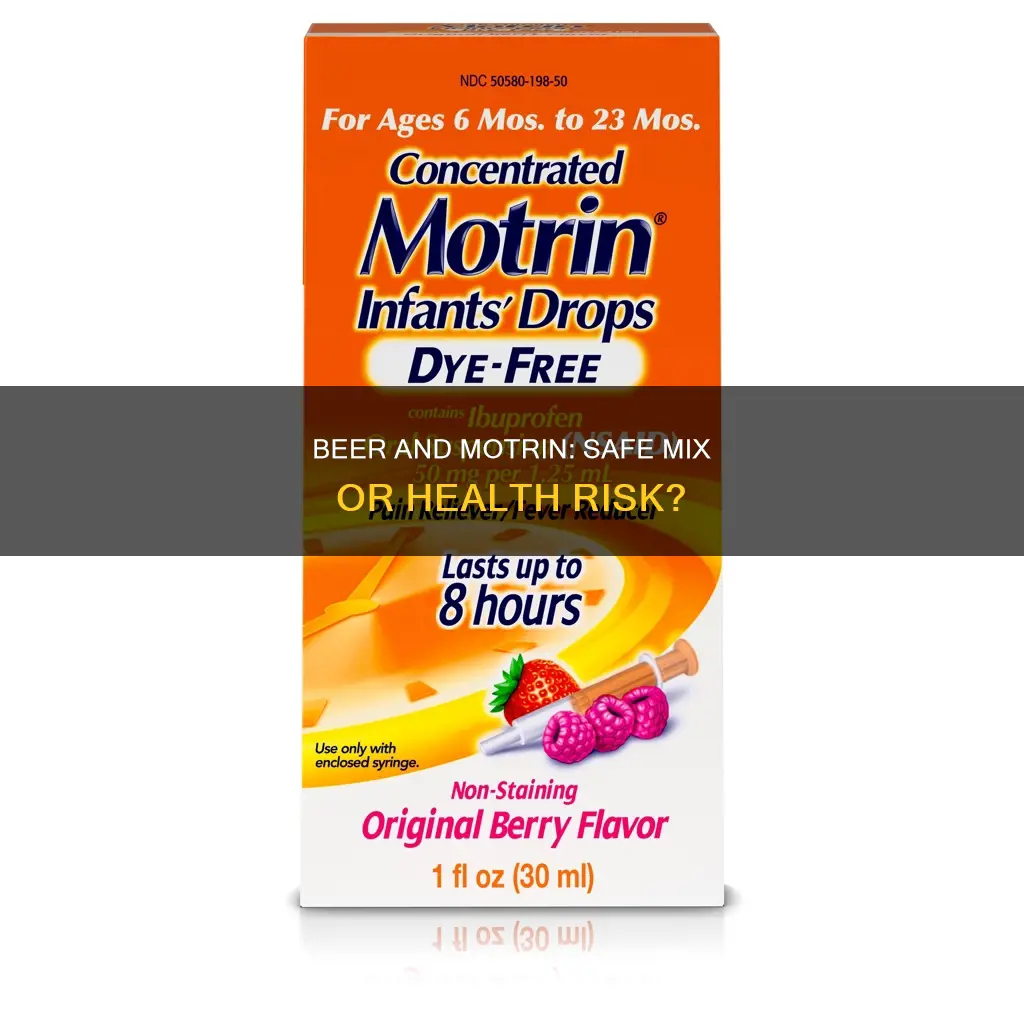
Motrin, also known as ibuprofen, is a nonsteroidal anti-inflammatory drug (NSAID) that is used to relieve pain, swelling, and fever. While it may seem harmless due to its availability as an over-the-counter medication, caution is advised when mixing it with alcohol. Although consuming a small amount of alcohol while taking Motrin is typically not harmful, regular use or excessive alcohol consumption can increase the risk of serious side effects.
| Characteristics | Values |
|---|---|
| Safety | Medically, it is not recommended to mix ibuprofen and alcohol. |
| Occasional Consumption | One drink with ibuprofen is typically okay for most people. |
| Regular Consumption | Regularly drinking alcohol with ibuprofen can cause serious side effects. |
| Side Effects | Gastrointestinal bleeding, kidney damage, liver problems, drowsiness, decreased alertness, and ulcers. |
| Waiting Period | It is recommended to wait at least 10 hours after taking ibuprofen to drink alcohol. |
What You'll Learn
- Ibuprofen and alcohol can irritate the stomach and digestive tract, increasing the risk of ulcers and bleeding
- The combination can lead to gastrointestinal (GI) bleeding, a serious condition with potentially fatal consequences
- Mixing ibuprofen and alcohol can cause kidney damage, especially for those with chronic kidney disease
- The combination may also lead to liver damage, as both substances can negatively impact liver function
- Central nervous system depression is another possible side effect, resulting in increased drowsiness and decreased alertness

Ibuprofen and alcohol can irritate the stomach and digestive tract, increasing the risk of ulcers and bleeding
Ibuprofen can irritate the lining of the stomach and increase the risk of gastrointestinal (GI) bleeding and stomach ulcers. Alcohol also irritates the stomach and digestive tract, and when combined with ibuprofen, the risk of ulcers and bleeding from the digestive tract is further increased. This is because both substances can erode the mucosal lining of the stomach, causing chronic inflammation and gastritis. The risk of GI bleeding is especially high for older adults, with men being more likely to experience GI bleeding than women.
The combination of ibuprofen and alcohol can also lead to other serious health issues. Both substances can cause kidney damage, and when used together, they can significantly increase the risk of kidney problems. Alcohol impairs kidney function by affecting the kidneys' ability to filter toxins, while ibuprofen affects kidney function by inhibiting the production of prostaglandins, hormones necessary for normal urine output. This combination can lead to acute kidney injury or acute renal failure.
In addition to kidney problems, the mixture of ibuprofen and alcohol can also cause liver damage. Ibuprofen can impair liver cells and cause a backflow of bile into the liver, leading to acute liver failure in severe cases. Alcohol is a major contributor to fatty liver disease and can increase the risk of cirrhosis over time. When combined with ibuprofen, the risk of liver damage is even higher.
To minimise the risk of adverse effects, it is recommended to wait at least 10 hours after taking ibuprofen before consuming alcohol. Additionally, it is advised to limit alcohol consumption to moderate levels and avoid heavy drinking while taking ibuprofen. For individuals with certain health conditions, such as kidney or liver disease, it is best to consult a healthcare provider to assess the risks associated with combining ibuprofen and alcohol.
Drinking Beer While Driving in Victoria: What's Allowed?
You may want to see also

The combination can lead to gastrointestinal (GI) bleeding, a serious condition with potentially fatal consequences
While taking Motrin (ibuprofen) with a small amount of alcohol is usually safe, combining the two substances can lead to gastrointestinal (GI) bleeding, a serious condition with potentially fatal consequences.
Ibuprofen is a nonsteroidal anti-inflammatory drug (NSAID) that can irritate the stomach and intestine lining. When taken for an extended period or in high doses, ibuprofen increases the risk of gastric ulcers or bleeding in the digestive tract. Similarly, alcohol can irritate the stomach and digestive tract, and mixing the two further increases the risk of ulcers and GI bleeding.
According to a study of 1,224 participants, regular ibuprofen use raised the risk of stomach and intestinal bleeding in people who consumed alcohol. People who drank alcohol but only used ibuprofen occasionally did not have this increased risk.
Symptoms of GI bleeding include:
- Blood in vomit or vomit that looks like coffee grounds
- Black or tarry stools
- Dizziness or fainting
- Stomach pain or cramps that do not go away
If you experience any of these symptoms, seek emergency medical attention.
To reduce the risk of GI bleeding, it is recommended to avoid mixing ibuprofen and alcohol. If you have consumed a small amount of alcohol while taking ibuprofen, do not drink any more, and consider eating a snack or a small meal and drinking water.
Beer Towers: How Do They Work?
You may want to see also

Mixing ibuprofen and alcohol can cause kidney damage, especially for those with chronic kidney disease
Ibuprofen is a nonsteroidal anti-inflammatory drug (NSAID) that is available over the counter and is used to reduce pain, fever, and inflammation. It is available under various brand names, such as Advil, Midol, and Motrin. While taking ibuprofen occasionally with alcohol is not typically a cause for concern, regular consumption of both can be harmful to your health.
Ibuprofen can irritate the lining of the stomach and intestine, and so can alcohol. Therefore, mixing the two can increase the risk of ulcers and bleeding in the digestive tract. The National Institutes of Health (NIH) state that ibuprofen can interact with alcohol, which can worsen the usual side effects of ibuprofen, including bleeding, ulcers, and a rapid heartbeat.
Ibuprofen and alcohol can also negatively impact kidney function. Ibuprofen affects kidney function by stopping the production of an enzyme called cyclooxygenase (COX) in the kidneys. This lowers inflammation and pain but also affects how well the kidneys can filter harmful substances from the body. Alcohol puts additional strain on the kidneys, and regular heavy drinking doubles the risk of developing chronic kidney disease, according to the National Kidney Foundation.
Thus, mixing ibuprofen and alcohol can cause kidney damage, especially for those who already have reduced kidney function or chronic kidney disease. People with underlying medical conditions, such as liver or kidney disease, high blood pressure, or heart failure, are most at risk of adverse effects from mixing ibuprofen and alcohol.
To reduce the risk of stomach upset when taking ibuprofen with alcohol, it is recommended to eat a snack or small meal and switch to drinking water. The safest option, however, is to avoid mixing ibuprofen and alcohol altogether.
Beer and Lip Injections: What's Safe to Drink?
You may want to see also

The combination may also lead to liver damage, as both substances can negatively impact liver function
Motrin, also known as ibuprofen, is a nonsteroidal anti-inflammatory drug (NSAID) that is available over the counter and is used to reduce pain, inflammation, and fever. Beer is an alcoholic beverage that contains ethanol, which is metabolised in the liver. While occasional consumption of a small amount of beer along with taking the recommended dose of Motrin is typically not a cause for concern, regular and heavy consumption of beer and Motrin can negatively impact liver function and lead to liver damage.
The liver is the primary site of alcohol metabolism, and during this process, several potentially dangerous by-products are generated, such as acetaldehyde and highly reactive molecules called free radicals. These by-products are more responsible for alcohol-induced liver damage than the alcohol itself. The liver is susceptible to alcohol-related injury due to its role in metabolising alcohol, and heavy, long-term alcohol consumption is a major risk factor for alcoholic liver disease.
Ibuprofen, as an NSAID, can also negatively impact liver health and cause rare but serious acute liver injury. A study in mice suggests that ibuprofen may be more likely to damage the liver than previously suspected, as it caused changes in metabolic pathways that regulate essential components of health, including amino acids, hormones, vitamins, and the release of reactive oxygen and hydrogen peroxide within cells.
When Motrin and beer are combined, the negative effects on the liver may be compounded. Both substances can cause separate types of liver damage, and the combination may increase the overall risk of liver injury. The liver plays a crucial role in maintaining whole-body homeostasis and regulating essential processes, so any disruption to its function can have significant health consequences.
Therefore, it is important to use Motrin with caution and avoid excessive beer consumption, especially when taking this medication. While occasional and moderate consumption of beer along with the recommended dose of Motrin may not cause immediate issues, regular and heavy consumption of both can increase the risk of liver damage. Consulting with a healthcare professional is always advisable to determine the safest approach for managing pain and inflammation while minimising potential harm to the liver.
Hand-Pulled Beer Pumps: Traditional, Unique, and Fun!
You may want to see also

Central nervous system depression is another possible side effect, resulting in increased drowsiness and decreased alertness
Drinking beer after taking Motrin (ibuprofen) can lead to several side effects, including central nervous system (CNS) depression. CNS depression is a physiological state that results from inhibited or suppressed brain activity. It can manifest as a decreased rate of breathing, a slower heart rate, and a loss of consciousness, possibly leading to a coma or even death. CNS depression is typically caused by the use of depressant drugs, such as ethanol, opioids, barbiturates, and benzodiazepines.
When CNS functions slow down, it is referred to as CNS depression. While a mild slowing of the CNS may make an individual feel less anxious and more relaxed, a severe depression of the CNS can lead to life-threatening complications. CNS depressants, including alcohol and certain medications, can cause an initial stimulant effect or a feeling of euphoria. However, these substances ultimately act as depressants, slowing down brain activity and resulting in decreased breathing and heart rates.
The combination of alcohol and ibuprofen can increase the risk of CNS depression. Alcohol is a CNS depressant that can interfere with the effects of medications, intensifying their side effects. Ibuprofen, a nonsteroidal anti-inflammatory drug (NSAID), can be purchased over the counter and is commonly used to relieve pain, swelling, and fever. While consuming a small amount of alcohol with ibuprofen is usually not harmful, regularly mixing the two can have negative consequences for the stomach and kidneys.
The risks associated with combining alcohol and ibuprofen are heightened for individuals with underlying medical conditions, such as liver or kidney disease, high blood pressure, or heart failure. Both substances can irritate the stomach and digestive tract, increasing the likelihood of ulcers and bleeding. Additionally, ibuprofen can impact kidney function, and when combined with alcohol, which can cause dehydration and hinder kidney filtration, the risk of kidney-related issues is further elevated.
To minimize the risk of CNS depression and other adverse effects, it is important to follow recommended dosages and avoid excessive alcohol consumption when taking ibuprofen. For those with underlying health conditions, consulting a doctor before consuming alcohol with ibuprofen is essential.
Beer Diet: Does It Work or Is It a Myth?
You may want to see also
Frequently asked questions
It is not recommended to mix alcohol with Motrin (ibuprofen). While having a small amount of alcohol with ibuprofen is usually okay, moderate to excessive drinking increases the side effects of ibuprofen, such as gastrointestinal bleeding and kidney and liver problems.
The side effects of drinking alcohol after taking Motrin include gastrointestinal bleeding, kidney damage, and liver problems. Both alcohol and Motrin can irritate the stomach and digestive tract, so combining them increases the risk of ulcers and bleeding. Motrin can also affect the kidneys, and alcohol can cause dehydration, making it harder for the kidneys to filter toxins.
It is recommended to wait at least 10 hours after taking Motrin to drink alcohol, as that is the time it takes for the average person's body to clear ibuprofen. However, if you have liver problems, it may take up to 17 hours. It is important to note that alcohol can stay in your system for about 24-25 hours, so it is best to wait at least that long after your last drink before taking Motrin.







